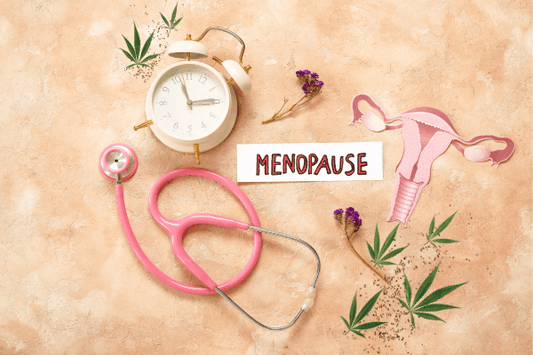
Harnessing Cannabis Power for Menopausal Comfort
Elements via Canva.com
Menopause, oh menopause. It's as predictable as the sunset, isn't it? Just another natural flag on the field of womanhood. Yet, despite its inevitability, it rides in like a wild rollercoaster, alternating between heatwaves, mood gymnastics, and sleepless nights. Now, what if I told you there's a silver lining to this stormy cloud? Ladies, lend an ear to cannabis. Based on an illuminating post by Harvard Health Publishing, more women are turning to cannabis as a tool for managing menopause symptoms.
So, strap in. Let’s explore the intersection of cannabis and menopause together.
Cannabis and Menopause: An Unexpected Ally?
Here's the thing: within the vast array of compounds in cannabis lie cannabinoids believed to help mitigate various menopause symptoms. The real magic comes from two primary cannabinoids—CBD (cannabidiol) and THC (tetrahydrocannabinol). CBD often garners praise for its relaxation benefits without inducing a high, while THC is the compound responsible for the plant’s well-known psychoactive effects.
According to Leafly, more women experiencing menopause are leaning toward cannabis strains with higher CBD and lower THC levels. This balance allows for symptom relief without a strong intoxicating effect.
Hand-Picking Cannabis Strains for Menopause: Find Your Fit
Now, let’s talk specifics. Some strains stand out for their potential in easing menopause symptoms, including ACDC, Harlequin, Cannatonic, Remedy, and Pennywise. Each strain carries its own unique profile that may help alleviate symptoms differently.
For instance, ACDC is known for its ability to calm anxiety, while Remedy might be just what the sleep-deprived need. However, menopause is different for everyone. What works wonders for one woman might not necessarily do the same for another. That's why research and a bit of trial and error are key in finding the right fit.
Understanding Cannabis Delivery Methods
If you're new to cannabis or considering it for menopause, knowing how to consume it safely is crucial. While smoking is the most traditional method, it's not always ideal. Fortunately, there are plenty of alternatives:
- Oils and tinctures: These offer precise dosing and can be taken sublingually for quick absorption.
- Edibles: A popular choice, but remember that they take longer to kick in—often 30 minutes to two hours.
- Topicals: Creams and balms infused with cannabis may help with localized pain or inflammation.
- Vaping: A smokeless alternative that allows for quicker effects than edibles.
Embarking on the Cannabis Journey for Menopause: Baby Steps
As with any supplement or treatment, starting low and going slow is key. If you’re new to cannabis, beginning with a small dose allows you to gauge how your body responds. Adjustments can be made gradually to find the right balance that works for you.
Moreover, consulting with a healthcare professional before using cannabis for menopause symptoms is always a good idea. They can guide you based on your medical history and help you navigate potential interactions with other medications.
A Friend in Relief: Cannabis and Quality of Life
Research and anecdotal evidence suggest that cannabis can be a multi-tool in managing menopause symptoms. From calming mood swings to easing body aches and improving sleep quality, this plant holds substantial potential. But remember—there’s no one-size-fits-all solution. Everyone’s biology is different, so an approach that works for one person might not be ideal for another.
Menopause is a transition, not a sentence. With proper guidance, testing, and a willingness to explore, cannabis may just be a tool for empowerment in this new chapter of womanhood.
You’re not alone on this winding path. There are aids—both modern and holistic—available to help you navigate menopause with confidence. So, here’s to finding relief and embracing this stage of life with strength.
Sources
For those looking to explore cannabis in different ways, consider checking out cannabis-infused recipes or learning how to roll a joint as a beginner.





